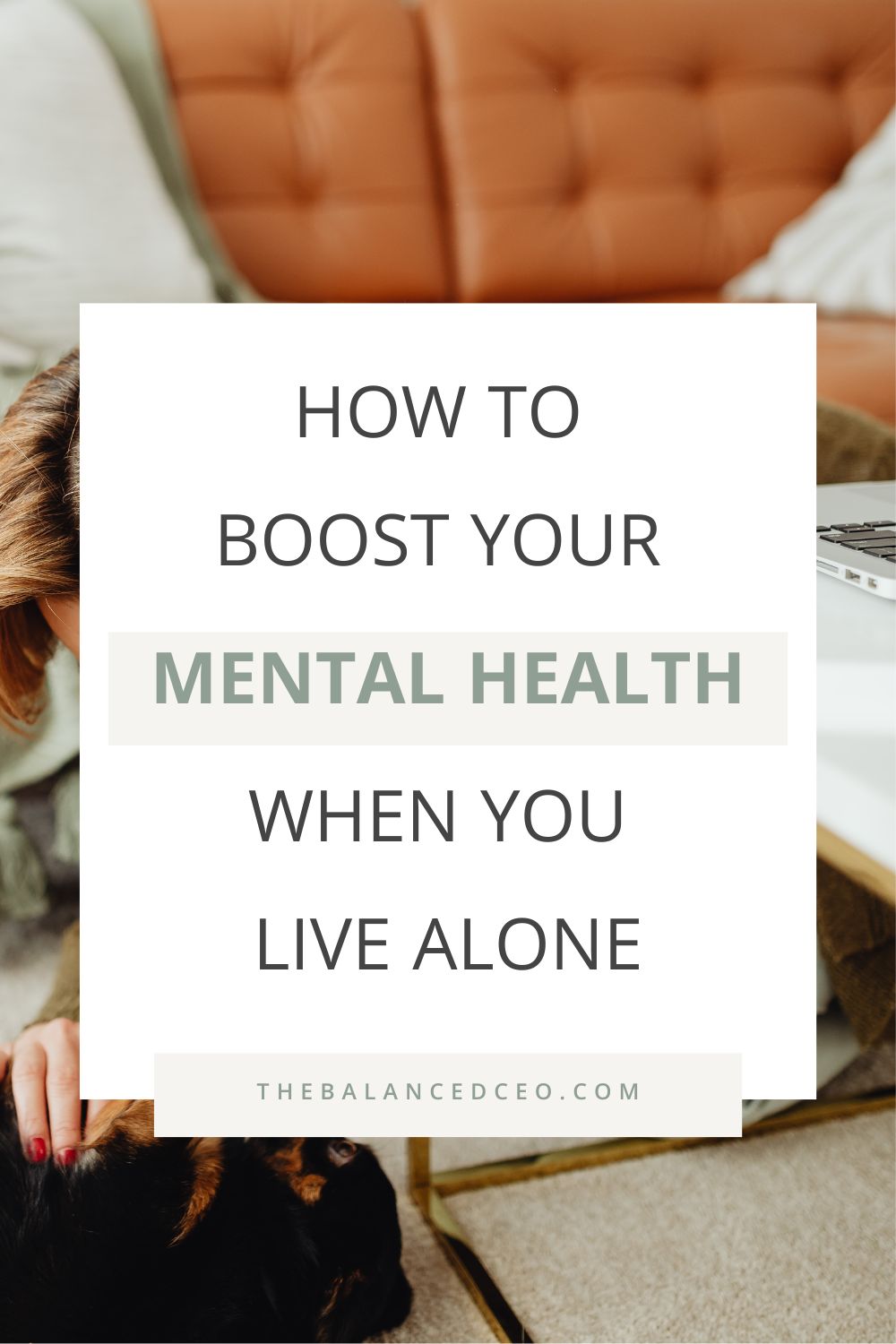This post may contain affiliate links, which means I’ll receive a commission if you purchase through my links, at no extra cost to you. Please read full disclosure for more information.

Living alone means you have the freedom to chart your path and pursue your dreams. It’s an opportunity to live a life on your own terms. However, amidst the freedom, challenging feelings like loneliness, stress, anxiety, and depression can creep in.
If debilitating feelings become constant companions, they can impact your mental health. How can you lead a fulfilling solo life while maintaining a healthy mental state?
How Does Living Alone Affect Mental Health?
Living alone, especially when you’re doing it for the first time, can make you vulnerable to loneliness. This feeling can surface at unexpected moments, such as when you’re eating dinner alone or have nobody to talk with. Loneliness often leads to anxiety and mood disorders and is a precursor of depression down the line, potentially triggering more self-isolation tendencies.
Loneliness is a feeling that doesn’t discriminate on age, given the rise in loneliness among young adults today. A lot of people who experience feelings like this often turn to alcohol as a means to cope. If this sounds like you then seeking treatment is so important. You can attend an outpatient rehab program if you feel as though you need help with that.
That’s why it’s essential to remain proactive. If you find yourself periodically wrestling with loneliness, stress, anxiety or depression, there are actionable steps you can take to improve your mental health.
10 Tips To Improve Mental Wellness While Living Solo
Living alone can be liberating, but after a while, you might miss waking up to a breakfast your parents prepared, watching TV shows with your siblings, and sleeping beside your family pet. These feelings are valid and commonly found among people who live alone, but they may increase your risk of mental health issues.
Fortunately, there are several ways you can help improve your mental health while living by yourself.
1. Do What Makes You Happy
Now that you’re living alone, you can have more time to work on yourself and do the things that bring you happiness.
Think of this as the perfect time to focus on yourself — what did you promise yourself you would do when living alone? Whether it’s learning a new recipe, attending a Pilates class, or watching an episode of your favorite TV series, small but fulfilling activities will help boost your overall happiness.
2. Explore New Things to Enjoy
In addition to doing things you already enjoy, living solo allows you to explore new interests. Before, your parents might have disapproved of you buying an electric guitar because of the noise it may cause. Now, you’re free to explore and experiment on your own.
3. Make Time for Self-Care
Stress can impact your mental health, making it more challenging to manage feelings of loneliness. Self-care allows you to return to a healthy point where you feel more energized to do productive tasks and nourish relationships with your loved ones.
Make an effort to squeeze in simple self-pampering activities a few times a week. You could soak in a hot bath after a stressful Monday, take night walks around the city every Wednesday, and order a sweet treat on Saturday.
Related Reads:
- 8 Ways Cortisol and Endorphins Affect Your Mental Health
- 7 Rage Journaling Prompts to Improve Your Mental Health
- How Your Home Can Affect Your Mental Health
4. Consider Getting a Pet
A furry, four-legged friend can add joy to solo living! A pet is more than just another responsibility — it is a living thing that provides companionship. The daily feeding, exercising, grooming, and care it will require will teach you about responsibility and consistency. Plus, keeping a pet means you’ll never return to an empty house!
Adopting a pet is a big responsibility, however, so be sure to do proper research first. Some pets, like dogs, can experience separation anxiety, so they might be better suited for someone who works from home or has a flexible schedule.
5. Exercise Your Mind
Staying mentally fit is as important as being physically healthy. Learn a new language or a skill, such as painting or knitting. You can also play brain training games such as puzzles to help boost your mental flexibility.
And lastly, practice meditation at the end of the day. Mindfulness meditation can help slow down brain aging and enhance cognitive abilities. When you let go of negativity while meditating, you help calm your mind and body.
6. Embrace the Beauty of the Outside World
Living alone makes it easy to isolate yourself in your own world, which can magnify negative thoughts and make them seem bigger than they are. Sometimes, all you need to do is open up to the world — open your windows in the morning, let the light in, breathe some fresh air, and greet your neighbors. These little steps will add a more positive start to your morning.
7. Spend Time With Your Loved Ones
While you may relish your solo time, the yearning for your dear family and friends is natural. To overcome loneliness, send them messages and texts. Staying connected is as simple as taking a photo of your dinner and sending it to your family.
A weekly video call to catch up with your loved ones is a great way to ease loneliness, too. And if you have free time on weekends, visit your parents at home or grab a brunch with a few friends.
8. Keep Your Body Moving
Regular exercise is one of the most helpful ways to keep stress and anxiety at bay. Whenever you’re feeling gloomy, bask in the sunlight, jog, and enjoy the morning breeze.
If you have a busy schedule, start slowly and do short workout routines. A short burst of physical activity can significantly help, such as a 10-minute brisk walking, which helps boost mental alertness, mood, and energy you’ll need to face the day.
9. Focus on the Brighter Side of Things
Even just thinking happy, positive thoughts can boost your mood. The next time you feel lonely, write your sad thoughts in a journal, then try to think of something that’ll help alleviate these feelings. For example, when you see an old friend on social media and compare your life with theirs, reflect on the good things in your life. List all the good aspects of your life and what you love about yourself.
10. Seek Professional Help
You tried all the tips listed above, but nothing seems to work in your favor. If you find yourself in a constant state of worrying, remember that you don’t have to go through it alone. For instance, if poor mental health has led to misuse of alcohol or drugs, the professionals at Forrest Behavioral Health may be able to help. It may seem scary to open up about loneliness, but a professional can offer the support you need to help you get through this phase.
You’re Not Alone
Living alone has its ups and downs, much like life itself. Follow the tips above and seek support when needed to enjoy the benefits of living alone while keeping your mental health at its best.

Cora Gold
Contributor
Cora Gold is the Editor-in-Chief of Revivalist magazine, a publication dedicated to happy, healthy, and mindful living.





Leave a Reply